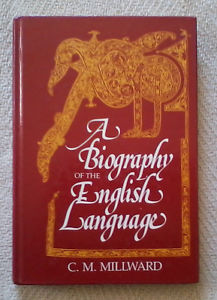
...

Who:Read this if you are a writer who likes to know what’s built into the words you’re using, what they say about their circumstances as well as what resonances they add for the knowledgeable. Read it if you love the minutiae of language, all the little “who would have thought” and “Although unlikely” facts that get seeded into long and drifty conversations, like the fact that Indo-European had three numbers: singular, plural, and dual.
Why: Read this so you can use words both more efficiently and more artfully. SO you know how the literary tradition you are working for and against, bound inextricably within, has been affected by linguistic change and created its own pressures to change in turn.
When: Read this when going among bores, for it will arm you with facts with which any recitation of X-Files plots or sports trivia can be met. Read this when you want something a little academic, with that cleansing flavor of self-improvement that the scrub of dry details can bring. Read it when you’re cramming for a test that involves volcabulary.
Where and how: Read this sporadically, tucking facts away, or with a notebook in hand. Read it for a class that takes you through centuries of linguistic change, showing you how history is tucked into every Vocabulary lesson.
#sfwapro
...
Want access to a lively community of writers and readers, free writing classes, co-working sessions, special speakers, weekly writing games, random pictures and MORE for as little as $2? Check out Cat’s Patreon campaign.

"(On the writing F&SF workshop) Wanted to crow and say thanks: the first story I wrote after taking your class was my very first sale. Coincidence? nah….thanks so much."

(science fiction, story) Each day began with that horrible moment when he put a hand out to touch Mindy’s shoulder—hey, honey, I had this awful dream you died, in a boating accident, no less, when was last time we were on a boat. Then the stomach dropping realization, sudden as stepping out into an elevator shaft.


This site is protected by reCAPTCHA and the Google Privacy Policy and Terms of Service apply. This site is a participant in the Amazon Services LLC Associates Program, an affiliate advertising program designed to provide a means for sites to earn advertising fees by advertising and linking to Amazon.com.